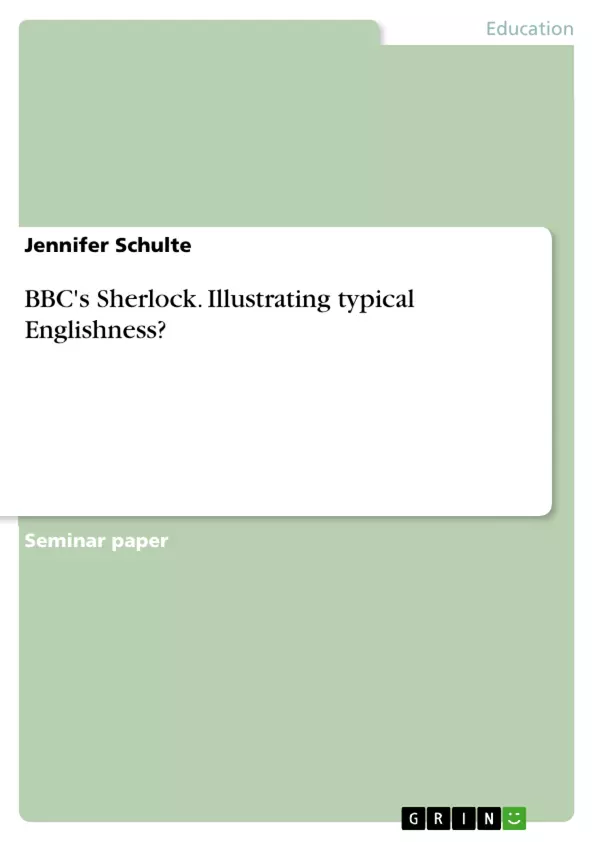This short paper is trying to show in how far Sherlock Holmes in the BBc version could be an exaggeration of something that we might call typical Englishness.
Inhaltsverzeichnis (Table of Contents)
- BBC's Sherlock - illustrating typical Englishness?
- Typical English Humour
- Social Dis-Ease
- English Intuition
Zielsetzung und Themenschwerpunkte (Objectives and Key Themes)
This analysis of the BBC series Sherlock aims to explore the concept of typical Englishness by examining the character of Sherlock Holmes, focusing on his portrayal of humor, social interactions, and intuition. The analysis aims to understand how these characteristics are presented in the show and if they contribute to Sherlock's perceived “madness” or simply represent a unique perspective on the world.
- The nature of English humor and how it is exaggerated in Sherlock's character.
- The portrayal of social awkwardness and how it relates to Sherlock's perception of social norms.
- The role of intuition and its relationship to Sherlock's ability to process information beyond the norm.
- The relationship between cultural perception and individual behavior, particularly in the context of Sherlock's unique perception of the world.
- The potential influence of a mental disorder on Sherlock's behavior and how it is portrayed within the narrative.
Zusammenfassung der Kapitel (Chapter Summaries)
- BBC's Sherlock - illustrating typical Englishness? This chapter introduces the concept of “Englishness” and how it is portrayed in the BBC series Sherlock. It discusses the relationship between Britishness and Englishness, highlighting the complexities of national identity and how stereotypes can be perpetuated. It also introduces the idea of Sherlock Holmes as an exaggerated representation of Englishness and explores the show's potential to challenge traditional notions of social interaction.
- Typical English Humour This chapter explores the portrayal of English humor in Sherlock, focusing on the character's use of irony and understatement. It examines how Sherlock's humor is used to highlight his detachment from social norms and how it contributes to his perception of himself and the world around him.
- Social Dis-Ease This chapter analyzes Sherlock's social interactions, drawing attention to his difficulties in understanding and responding to social cues. The analysis discusses how his behavior aligns with the characteristics of social dis-ease and explores the potential link to a diagnosis of Autism Spectrum Disorder. It examines how Sherlock's social difficulties might be related to his unique way of perceiving the world.
- English Intuition This chapter delves into Sherlock's ability to process information and his reliance on intuition. It explores how his "mind palace" allows him to store and utilize information in a way that surpasses the capabilities of most individuals. This chapter examines the differences between Sherlock's reliance on intuition and the more general tendency towards instinct among English people.
Schlüsselwörter (Keywords)
This analysis focuses on key themes of Englishness, humor, social interaction, intuition, and perception. It explores how Sherlock Holmes's unique character embodies exaggerated aspects of Englishness, potentially revealing the nuances of cultural identity and the subjectivity of human perception. The analysis also touches on the potential connection between Sherlock's behavior and a diagnosis of Autism Spectrum Disorder, highlighting the complexities of understanding social and mental differences.
- Quote paper
- Jennifer Schulte (Author), 2014, BBC's Sherlock. Illustrating typical Englishness?, Munich, GRIN Verlag, https://www.hausarbeiten.de/document/429010


